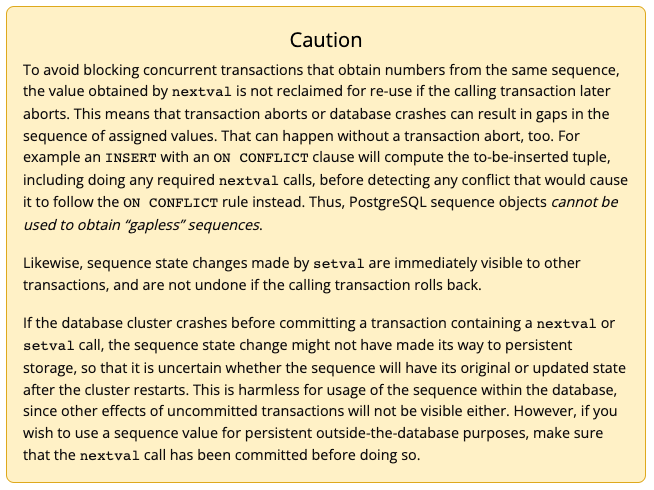That Postgres sequences aren’t restored after a transaction rollback
Verify by creating a table and inserting a single row
# create table people ( id SERIAL, name TEXT );
# \d people
Table "public.people"
┌────────┬─────────┬──────────┬────────────────────────────────────┐
│ Column │ Type │ Nullable │ Default │
├────────┼─────────┼──────────┼────────────────────────────────────┤
│ id │ integer │ not null │ nextval('people_id_seq'::regclass) │
│ name │ text │ │ │
└────────┴─────────┴──────────┴────────────────────────────────────┘
# insert into people (name) values ('Alan');
then the next id to be allocated will be 2:
# select currval('people_id_seq') + 1 as next_val;
┌──────────┐
│ next_val │
├──────────┤
│ 2 │
└──────────┘
Now open a transaction and insert a new row, which increments the
people_id_seq sequence, then roll back:
# start transaction;
# insert into people (name) values ('Barry');
# rollback;
There’s still only one row in the table, but the next available id is now 3:
# table people;
┌────┬──────┐
│ id │ name │
├────┼──────┤
│ 1 │ Alan │
└────┴──────┘
(1 row)
# select currval('people_id_seq') + 1 as next_val;
┌──────────┐
│ next_val │
├──────────┤
│ 3 │
└──────────┘
Hence rolling back a transaction does not restore the sequence associated with its primary key.
There’s a cautionary note about this in the Postgres docs on sequence manipulation functions:

Flakey tests
This phenomena can cause flakey tests, which is how I became aware of it.
By default, Django executes tests in a transaction that’s rolled back as part of the test’s tear-down phase. This means that any data inserted into a test database isn’t readable to subsequent tests (and can’t pollute them).
But, as per the above, sequences are mutated and so tests do affect the primary keys allocated in subsequent tests. This is a subtle form of test pollution.
The flakiness occurs when a test hard-codes the value of a primary key. For example:
# Some factory class that inserts rows into a Postgres table.
from factories import FrobFactory
def test_create_frobs():
# Insert a row into a table using the default sequence to provide the ID.
FrobFactory()
# Insert a second row but hard-code the ID.
FrobFactory(id=123)
This test can fail if the first FrobFactory instance is allocated a primary
key of 123, meaning the second FrobFactory call will error on a uniqueness
constraint.
Whether this happens depends on the tests that run beforehand. If the prior
tests insert 122 rows to the table then the first FrobFactory call in this
test will be given an id of 123.
This fails intermittently as it depends on the order and constituents of your test suite, which will change as new tests are added.
Rule-of-thumb? Avoid hard-coding primary keys in your test fixtures.